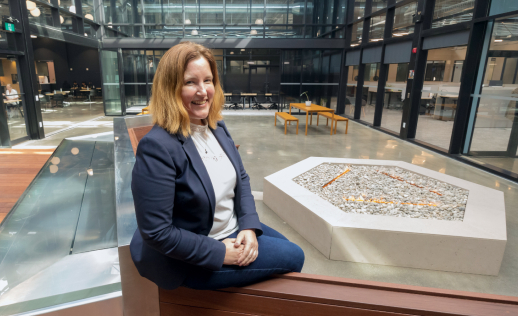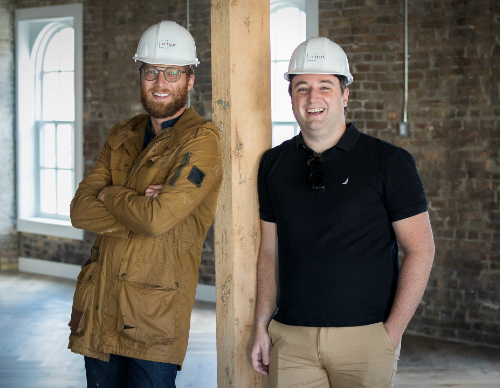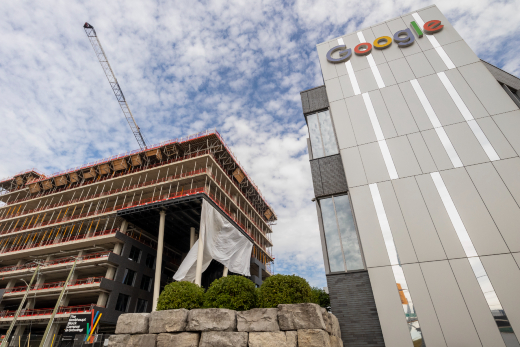When Vidyard co-founders Michael Litt and Devon Galloway decided to shift the company to a permanent digital-first model early in the pandemic, some questioned the move.
The two partners, who launched the Kitchener-based video-for-business startup as University of Waterloo students in 2010, reasoned that the pandemic would last at least a year, if not longer, so why not embrace the inevitable?
They’d likely need to retain some collaboration space, but that could be worked out later after discussing it more with their employees and experimenting with their existing space at 8 Queen St. N. in Kitchener.
“We started polling our team and we came to the conclusion that in-person interactions are still incredibly valuable, but they do not need to happen every single day,” says Litt, Vidyard’s CEO. “That’s when we thought, OK, we can probably downsize the full amount of space based on the data we’re seeing.”
Some outside observers thought Vidyard was moving too fast.
“At the time we did it, there were a lot of people that thought it was too soon, but we knew that we couldn’t make a half-step,” says Litt. “We would have to either go all the way or we would just be waiting, right?”
It’s a decision that many other tech founders are still grappling with.
As the pandemic fog begins to lift, company leaders are looking to the horizon and trying to decide what workplace model best suits the needs of their businesses and the wants of their employees.
Fully remote? Fully on-site? Something in between?
Judging by a renewed interest in office space, many companies are hedging their bets.

Angela Watkins, General Manager of Catalyst Commons in Kitchener's Catalyst137 complex,
in the indoor courtyard of the co-working space. (Communitech photo: Anthony Reinhart)
“I refer to it as kicking the tires to see what’s out there and see what the options are,” says Angela Watkins, General Manager of the 65,000-square-foot co-working space known as Catalyst Commons. “We’ve been seeing a huge pick-up, I would say, in the last 12 to 16 weeks.”
Developer Frank Voisin is experiencing the same thing.
“We’ve done 120,000 square feet of leasing in the last few months,” says the President of Voisin Capital, whose projects include tech-oriented office buildings such as 8 Queen St. N. and Catalyst137 (which houses Catalyst Commons), both in Kitchener. “The leasing market started picking up in mid-May in a really big way and then was strong straight through the summer.”
A recent report from commercial realtor CBRE found that the office vacancy rate in Waterloo Region – both core and suburban locations – was 11.1 per cent overall in the second quarter of 2021, up from about 10 per cent just prior to the start of the pandemic. Sublet vacancy rates increased to 17.8 per cent in Q2 2021, up from about 10 per cent in the fourth quarter of 2019.
In downtown Kitchener, the vacancy rate in Q2 2021 was 24.5 per cent; in Uptown Waterloo, it was 10.7 per cent. The average office lease rate in Q2 2021 was $14.91 per square foot in the Kitchener core and $16.39 per square foot in Uptown Waterloo.
The CBRE report also noted the uptick in office-space activity.
“Office tours are regaining momentum with renewed interest in anticipation of reopenings and the return to the office,” it says. “With 748,000 sq. ft. of available direct and sublet space, turnkey spaces are readily available within the Kitchener Core for tech tenants looking for space in the Waterloo Region.”
Before the pandemic, startups relied heavily on interesting, collaborative work spaces and various office perks as recruitment tools in a highly competitive market. Now, as pandemic restrictions ease, they’re introducing flexibility into the mix as a way to attract and retain talent.
Craig Beattie, CEO of Perimeter Development Corp., says tech companies are exploring their office-space options, consulting with employees and trying to figure out what will work best for their individual work cultures in a post-pandemic world.
“It’s a wide spectrum of what companies are doing, and I think there’s going to be a fair bit of experimentation going on,” says Beattie, whose company developed the Google-occupied Breithaupt Block in Kitchener’s Innovation District and is currently adding an 11-storey building to the complex. “Every company is going to have to try to find what they feel is best for their organization and for their people.”
Voisin agrees, adding that potential tenants are looking for space that provides them flexibility of use.
“The vast majority of companies that we’re talking to have settled somewhere in the middle ground of saying, ‘We're going to be flexible with people,’ (whether) they want to come in two or three days a week or four days or five days,” he says.
In addition to flexibility, “collaboration space” is another frequently heard term, says Watkins.
“Everybody is looking at the hybrid model in their own unique way,” she says. “What a lot of them are doing is taking a much smaller footprint. So, if they were 10 to 20 employees, teams of that size – where they would typically have anywhere between five and 10,000 square feet – they’re now taking upwards of maybe 1,000 square feet for four to six people at max, and they'll rotate through.”
Vidyard is a good example of a company that has committed to digital-first while recognizing the need to retain some bricks-and-mortar space for team collaboration and the needs of individual employees.
The rapidly growing company, which has increased from 160 employees to more than 300 over the course of the pandemic, had been headquartered in 30,000 square feet of space in the Voisin-owned building at 8 Queen St. N. in downtown Kitchener.
Going forward, the company plans to create smaller “collaboration centres” in locations where it has 20 to 30 employees, rather than lease a more traditional-sized office. The centres will be designed on a coffee-shop format, with individual tables and space for group work.

Vidyard co-founders Michael Litt (left) and Devon Galloway inside the
company's future office at One Queen in Kitchener.
(Communitech photo: Anthony Reinhart)
"The idea is, instead of having 10 floors in one city, let’s have one floor in 10 cities,” says Litt. “And so, how do we think about the creation of a space that can give those individuals who don’t have enough space at home a place to go and open a laptop and sit down and do some focused work, and to give those extroverts the ability to go interact with people, as if they’re working in a coffee shop?”
Vidyard already has this kind of collaboration space for its employees in the Vancouver area. A similar setup is being created in downtown Kitchener at 1 Queen St. N., the old American Hotel building, which is currently undergoing a complete redevelopment. Vidyard will occupy 20,000 square feet on the top two floors, and hopes to begin using the space later this fall. Meanwhile, it has retained one floor in its former headquarters across the street at 8 Queen St. N.
Litt says Vidyard’s move to digital-first made competitive sense from a talent perspective, as the pandemic rendered location far less relevant for many tech workers.
“We grew the team by close to 100 per cent through the (pandemic) period, and we’ve been able to work with a talent pool that is now much more distributed on a global basis, which gives us, frankly, better access to multiple individuals who have the skill sets we need.”
On a more philosophical note, Litt says that despite the pain and disruption caused by COVID-19, the pandemic has generated positive change. One example is the role of technology in a healthy reimagining of traditional work structures.
“That’s probably one of the biggest things for me and my team, is that ability to spend more time at home and that ability to be closer to family, and that’s an upside that is very unlikely to be discussed in any article about the pandemic,” he says. “To fully recover from this, we have to start thinking about the upside and embrace it.
“If I play this out over a five-year period of time, it’s clear to me that this is ultimately the winning strategy in terms of optimizing talent-pool exposure, creating collaborative spaces for people to work in, and giving people an opportunity for work that’s in line with the promise of technology.”
Tech News asked a number of other companies in Waterloo Region about their office-space plans. Here’s what we found out.

Construction continues on an expansion of the Breithaupt Block in Kitchener,
home to Google's Canadian engineering headquarters.
(Communitech photo: Anthony Reinhart)
The tech giant is famous for its campus-centred work environment, providing employees with elaborate meals and snacks, social activities and other perks. COVID-19 forced it to relax that model and accommodate more remote work. In a blog post last May, Sundar Pichai – the CEO of Google and its parent company, Alphabet Inc. – told employees that “Google’s future workplace” would involve a hybrid structure that gives them the flexibility to work on-site and at home several days a week, with opportunities to work remotely on an extended or full-time basis.
That approach will be available to Google employees in Waterloo Region, where the company has grown steadily since first arriving here in 2005 through the acquisition of a startup called Reqwireless. Today, Google occupies 185,000 square feet in the Breithaupt Block complex in Kitchener’s downtown Innovation District. The company’s local workforce has grown to 1,300, with plans to add more staff over the next few years. To accommodate that growth, Google plans to take additional space in the third phase of the Breithaupt Block – an 11-storey, 300,000-square-foot building that’s now under construction.
Shopify
The Ottawa-headquartered online retail powerhouse opened a small office in the Tannery in Kitchener in 2014, moved into a 40,000-square-foot space in the former Seagram Museum building in Uptown Waterloo in 2016, and added another 62,000 square feet on nearby Willis Way in 2018.
Then COVID-19 struck. In May 2020, Shopify became one of the first companies to announce a permanent shift to what founder and CEO Tobi Lütke called a “digital by default” work model. The company began to give up its office space in Ottawa and elsewhere. In Waterloo, it vacated its two floors at 85 Willis Way. Shopify still has the Seagram’s building but remains quiet about its use.
“Shopify is now a remote-first workplace so we don’t have any additional details to share with you on office space or where employees are located as people are free to work wherever they want,” the company told Tech News via email.

Faire is set to occupy space vacated by Shopify on Willis Way in Waterloo. Shopify,
which has moved to a "digital by default" working model, maintains
a physical space in the former Seagram Museum nearby (lower left).
(Communitech photo: Anthony Reinhart)
Faire
What Shopify no longer needs, wholesale platform Faire has snapped up. The company, a unicorn that has raised hundreds of millions of dollars since it was founded in 2017, said in June that it is expanding its Canadian operations and moving its Waterloo Region workforce – more than 150 and growing – into Shopify’s former space on Willis Way.
Faire plans a hybrid mix of on-site and remote work going forward, and hopes to have staff working out of the Willis Way office later this year.
Encircle
Kitchener-based Encircle, whose software simplifies the insurance-claim process, has decided to go remote-first, says Deirdre Falkiner, the company’s Director of People and Culture.
She’s quick to add that flexibility is paramount. That means continuing to provide a physical work space and giving employees the choice to work there regularly, or just a few days a week, or to work remotely.
“Remote-first means different things for different organizations,” says Falkiner. “So for us thus far, what that means is we’re giving flexibility and choices to our employees.”
Encircle, which employs 60-plus people and has office space in the Tannery in Kitchener, has always valued flexibility – so much so that the company developed work-from-home guidelines even before the pandemic struck in March 2020.
Falkiner says the company has been surveying employees throughout the pandemic to understand their worksite preferences, and to help the company plan its future space requirements.
Tulip
Similar to the Vidyard experience, Tulip’s recent workplace decisions have been shaped by the competition for talent and the transformative pressures of COVID-19.
The company, which provides a retail app that helps salespeople better serve their customers, moved to a remote-first model earlier this year. It also began experimenting with a shortened work week, based on a popular model that originated in Iceland.
Tulip has retained its office on Michael Street in Kitchener, near the Tannery, but it no longer has a physical space in downtown Toronto.
Founder and CEO Ali Asaria says the changes stem from Tulip’s ongoing conversations with the company’s 160 employees, as well as from what they’re hearing from potential recruits, many of whom prize workplace flexibility and corporate values in addition to financial compensation.
“We did a lot of research with our staff around what are the drawbacks to working remotely and working from the office – and not everybody loves working remotely every day – but we found people appreciate the flexibility,” says Asaria. “So, that was the first thing, we said we’re going remote – we’re actually going to unlock the ability to hire remotely and enable people to live wherever they want.”
He acknowledges the challenges of remote-first models – nurturing a sense of community, for example – but he’s hoping that interactive communication technologies will keep improving as a result of the pandemic.
“We’re trying to figure that out,” he says. “We’re trying to basically do everything we can to show that we’re doubling down on flexibility and trust with our workplace.”

